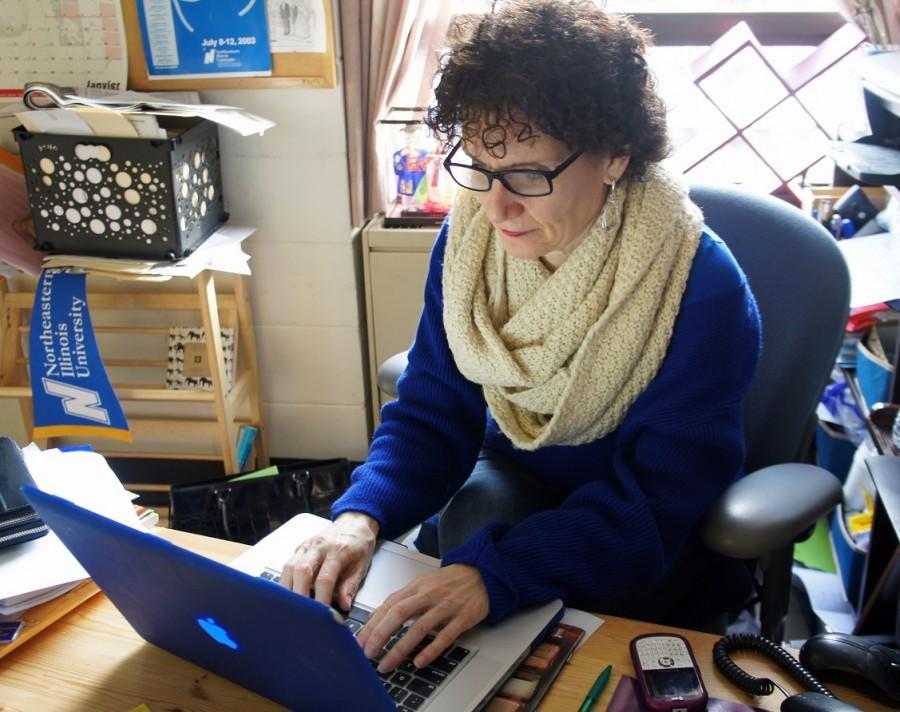Culture of the Tongue
Dr. Kaplan-Weinger midst the daily grind of being a professor at her office.
February 25, 2015
Exploring humanity under a lens of language, linguistics professor Judith Kaplan-Weinger and NEIU alumna Char Ullman recently co-wrote a textbook titled “Methods for the Ethnography of Communication: Language in Use in Schools and Communities.”
Dr. Kaplan-Weinger explained, “Ethnography from an anthropological standpoint looks at anything and everything about behaviors and cultures. Ethnography of communication is just looking at the language aspect of culture.”
“Ethnography of communication is a way of finding out how members of different communities use language. The idea is we accept that diversity in language use exists in the world. This is a way to gather information about that diversity in language use and analyze it,” elaborated Kaplan-Weinger.
The main goal of the textbook is to serve as a resource for students across various disciplines such as anthropology, education, linguistics and sociology. “The point is it takes you through the steps of the research process, the ethnographic research process, from deciding what community to study through gathering data, talking to people in the community, writing up your data, analyzing your data and presenting your data,” Kaplan-Weinger said.
The book is more than just an instructional guide however, it incorporates aspects of social theory that Kaplan-Weinger has a personal connection to. “I feel like I was born an ethnographer in a sense that I always observed and took in the world and tried to figure out what was going on and learn by observing. And that to me is what ethnography’s about. When you’re doing it in school there’s some theory behind it. For example one of the focuses on our book is the idea of…social theory.”
Kaplan-Weinger added, “It’s the idea of what we call the subaltern. The people who are not given a voice by the rest of us…therefore may feel that they don’t have a voice. So if ethnographers who choose to can go into those communities and share with the rest of the world that these people have a voice…and get that information out on a social justice side, we’re helping give a voice too.”
It’s important to note that this social theory is a relatively recent development in the social sciences. Kaplan-Weinger continued, “Scientists, theorists, we used to really keep a line and we’d say ‘we don’t go over the line,’ so we stay descriptive and objective and that’s it. But with social theory people have begun in a sense crossing the line and being able to, when asked, make recommendations.”
Kaplan-Weinger advocates for the idea of using ethnography to achieve social progress. “Again…it’s best when a member of that neighborhood, that community, finds out about ethnography or sociology or social justice or anthro or something and says ‘Wow, I can use these tools to study my community and to share my community and the truth about my community from the inside out,’ that’s so valuable because we all close our eyes to somebody, to something.”
Ethnographic studies also have practical applications in the business world. “Ethnography itself is used in not only anthropology, it’s used in medicine, it’s used in corporations. For example, corporations will bring ethnographers in to… find out how things are working,” says Kaplan-Weinger.
Individuals who aren’t academics, businesspeople or social justice crusaders can also benefit from learning about ethnography. As Kaplan-Weinger explained it, ethnographic studies opened her mind. “Ethnography has taught me over the years – and it’s been 30 years – to value each and every person and therefore each and every community for who they are and what they are. Because what ethnography does is get you to understand people from their point of view and even if I don’t know every person in this universe, what that teaches me is everybody does have a point of view and if everybody has a point of view, I have no business saying what’s better or worse. It’s a funny thing but I would call ethnography like my perspective or my vision of life. It’s how I live my life.”








